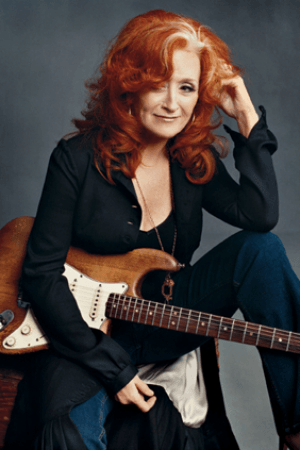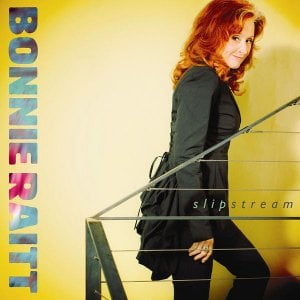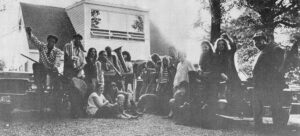By Graham Reid

When Bonnie Raitt’s most recent album Slip Stream – her first in seven years – picked up a 2013 Grammy for best Americana album, it was yet another rung on her increasingly high ladder. Her 10th Grammy in fact.
At the previous year’s awards she had paid tribute to the late Etta James performing with Alisha Keys, and her signature song I Can’t Make You Love Me has most recently been covered by Katy Perry, Adele and Bon Iver, and has become a staple on Idol shows.
Slip Stream (reviewed here) was not just hailed as one the finest in her long career, but also saw her with the biggest selling blues album of 2012. Produced in part by Joe Henry and with remarkable songs like You Can’t Fail Me Now (destined to become a sister-song in her catalogue alongside I Can’t Make You Love Me) Raitt has an album which rocks, touches deep places, covers Dylan and Gerry Rafferty songs – and gives her something to play on the road, she laughs.
But the past few years have not ben easy for Raitt, as she admits in this typically candid interview with Elsewhere in advance of her New Zealand tour (dates below).
This album’s success comes at a good time for you because I understand the past few years have been difficult with deaths in your family.
It comes with your 50s and 60s because your parents are getting up there. But I was touring when my folks were ill and passing, and it was very fraught to have my brother battling brain cancer at the same time as my parents passed away. Then I toured for two years when Souls Alive came out – and came through your neck of the woods in 2007 – and then my brother developed another tumour and passed in 2009/ So I did one little tour of the States with Taj Mahal which was healing and cathartic but then I had to take a break.
So I had my first ever hiatus in 2010 and literally just stayed in my own home and watched four seasons go by in my own neighbourhood. I’d never spent four seasons in one place.
Was that difficult at all, just to be in one place for so long?
I was pretty wracked with a lot of grief that I was finally experiencing so it was very healing to be able to not do anything. When you go through something like that it’s useful to be busy because it’s distracting, but in the case of having to be on all the time and run a big corporation and keep a band and crew going . . . I just needed to unload that for a while.
The good news is that it’s good to feel all those things and fall apart, the bad news is it’s much more difficult to finally feel those things. If you try to bottle things up you get physically ill and you run out of fumes.
I didn’t have any inspiration to come up with new music until I took a break. When I had enough time at home I wanted to wait until I missed it.
I don’t miss the year of promotion, but I missed the year of playing. But luckily I had a wonderful freshwater bath with Joe Henry calling me up and saying, ‘Let’s try a couple of songs’ and the next thing I knew it was like getting back on the horse. And I was raring to go.

You have always struck me as a very grounded person in a mature way and you have always been musically and politically active. When you had that time out did you discover there was a Bonnie Raitt that you had forgotten about in there.
Absolutely, not that we are doing a therapy session here. (laughs) But there is always a balance between the personae of your life as your work or as your parents’ kid – or you are the wife and with your children. But you are all these people wrapped up in one. I think I was relying a bit too much on the professional side.
But there is a lot of overlap in what I do, it doesn’t stop at 5pm.
I think I had to address a lot of relationships in my family and aspects of myself that I really haven’t, in 40 years of being on the road, given any shrift to. So I can’t say it was the easiest thing I did, but it was rewarding and transformational in the sense I was getting to know parts of myself, and self-discovery because I don’t know what I would be with out that gig.
So even though I had time off before in between records and getting ready for tours, I now had time to see what would happen if I didn’t have support the big thing.
Did you put a stake in the ground and give yourself a year?
I did and turned down all the benefit requests, and that was hard for someone who is an activist like me, just on guilt level let alone strategically and politically. There were a lot of groups who are accustomed to the support they get from my tours. It was hard line to draw in the sand but I made a commitment to not sitting in with someone, because the next week somebody else is coming through and they want you to sit in also.
It wasn’t that hard to do in some respects, I just didn’t feel like being the capital letter version of myself and was enjoying staying at home and I had a lot of soul work to do. It wasn’t appropriate for me to suit up as this bigger personality.
I will ask about Slip Stream in a moment, but did the private Bonnie Raitt start painting or cook more?
I wish. (laughs) I had all these ideas we all think about, like if we had six months sabbatical and we say, ‘Oh then I could buy some paint and get an easel’ Or take some guitar lessons for the first time or get my piano chops together, but none of that really happened. The best thing I could do was go out in nature and I did a fair amount of therapy, made meals, took long walks . . .
I had aspirations to do a whole bunch of stuff but I just need to be. That sounds northern California but that was exotic enough not to be doing anything.
We call that mucking about.
(Laughs) That’s exactly what it was. The other thing that gets in the way, and not to whine, but there were all these things you don’t get to address when you go on the road in that bubble. Like there are rooms full of stuff of my parents’ to go through. I am the caretaker for my brother’s and my folks lifetime of papers and photographs and that was almost overwhelming. I started to long for going on the road so I didn’t have all that homework.
You have to learn to that balance being an adult in an adult situation. You as a journalist are probably in one place more often than me so you know the writing gig is the romantic one ,but taking care of your chores isn’t as much fun as running away with the circus.
I have a cartoon above my desk of a man slumped over his typewriter saying to his partner, ‘You know what bugs me most about writing? It’s just work!”
It is. I was thinking about renting a cabin so I could just go away and do my own thing to get away.

Let’s talk about Slip Stream. Mr Henry and Mr Wainwright seem to have gifted you a classic Bonnie Raitt song in You Can’t Fail Me Now.
Isn’t that the most amazing tune?The had written that for a movie, at least it was on the soundtrack to Knocked Up and Loudon cut it [on Strange Weirdos]. I heard it on Joe’s album Civilians but the melody reminds me of the first time I heard Not The Only One by Paul Brady. Sometimes there’s a melody that is just so out of the park . . . and the line about ‘mercy is just a warning shot across the bows’. C’mon, get outta here, that is so great.
A real Loudon line.
Oh yeah. Isn’t he something? Randy Newman, Paul Simon and those guys . . . forget it. Just the greatest.
What does Joe Henry bring when it comes to producing Bonnie Raitt that longtime Raitt producers like Tchad [Blake] and Mitchell [Froom] don’t?
We’re all different I guess. I come with a fully formed idea of a song and how I want to sing it but the reason I wanted to work with Joe is because I knew I would do most of the record myself but I pick partners, whether it’s Don Was or whoever and I see what sonic atmosphere I want to have. When there is mutual respect it’s a great chemistry.
You go so far with some records though and I want to freshen it up, and that’s what I wanted to do with Joe. He called me right around the same time as I was going to cal him because I had three of his songs I wanted to cut. He said Mose Allison and Allen Toussaint, both of whom are friends of mine, suggested he give me a call and was delighted to find I was thinking the same thing.
We’re like soul mates. He has as much appreciation and understanding of me as I have for him and that’s mutual in that we are both artists. There’s an unspoken affinity that means we don’t have to analyse what’s going to happen when we get in the room together.
We talked about which songs – we threw some ideas at each other – and he came up with Dylan’s Million Miles Away and we also cut, which will come out in the future, Blind Willie McTell.
And I loved the players he had and he wanted to use. We both love Bill Frisell and he said he’d love to come out.
The studio is in the basement of his big house in Pasadena and I’d heard about the magic of those sessions there and I’d loved the way records done there can sound. So what he brings is just his atmosphere, the musicians, his sensitivity. . . and he’s also kind and generous. He gets me and he gets it.
There are heartfelt songs on there like Standing on the Doorway but you also pull out the rock stuff and when I first heard Down to You I thought of the Stones’ Exile on Main Street period.

That’s my guitar player George Marinelli and he got the gig years ago because he and I can do that Ronnie’n’Keith thing. My band can play any kind of music. Bassist James Hutchinson been with me for 30 years, [drummer] Ricky Fatar since the Green Light album in ’81 . . . so they are fine set of musicians. And now we’ve got Mike Finnigan who is a legendary Hammond B3 player and singer . . .
We are all born to do this and especially as the music business implodes on itself there are not that many acts which are self-supporting anymore. I’m so grateful that my fans still want to see us and we’ve been selling out everywhere and the record is still doing well. You know we’ve done 42 years without hit singles so it’s is pretty amazing to have that kind of loyalty
But many of your songs have written themselves into people’s lives. I imagine fans would accept anything you care to do, but you would still always have to play I Can’t Make You Love Me.
Oh, I wouldn’t do a show without it because I know people haven’t seen me in several years and that song means as much to them as it does to me.
And Angel from Montgomery is right up there too.
But I will also be playing songs from the new album. Most people make an album and then go out and tour it. I just make a record so I have 12 new songs to play on the road.
Source: © Copyright Elsewhere












 Visitors Today : 101
Visitors Today : 101 Now Online : 4
Now Online : 4















































































































